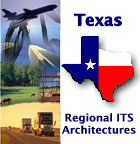| 1.0 | TRAVEL AND TRAFFIC MANAGEMENT |
| 1.2 | EN-ROUTE DRIVER INFORMATION |
| 1.2.3 | DI shall provide an In-vehicle Signing capability. |
| 1.2.3.2 | The DI In-vehicle Signing function shall include a long term capability to serve more of the traveler's needs. |
| 1.2.3.2.3 | The In-vehicle Signing function shall provide the capability to utilize data from roadside environmental sensors as inputs to warning messages. |
| 1.6 | TRAFFIC CONTROL |
| 1.6.0 | ITS shall include a Traffic Control (TC) function. Traffic Control provides the capability to efficiently manage the movement of traffic on streets and highways. Four functions are provided, which are, (1) Traffic Flow Optimization, (2) Traffic Surveillance, (3) Control, and (4) Provide Information. This will also include control of network signal systems with eventual integration of freeway control. |
| 1.6.2 | TC shall include a Traffic Surveillance function. |
| 1.6.2.5 | The wide area surveillance shall acquire sufficient data to provide the system with the knowledge of the existing conditions. |
| 1.6.2.5.2 | The data process function shall process traffic data to generate near term predictions of traffic conditions. |
| 1.10 | HIGHWAY RAIL INTERSECTION |
| 1.10.2 | HRI shall provide interfaces between highway and rail management functions. |
| 1.10.2.1 | HRI shall provide information management interfaces between highway and rail to coordinate traffic, demand and schedules. |
| 1.10.2.2 | HRI shall provide the capability for interactive real-time interfaces. |
| 1.10.2.2.2 | HRI shall provide the capability to interface with traffic management functions for highway traffic coordination. |
| | |












 Web Spinner Technology.
Web Spinner Technology.